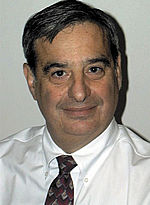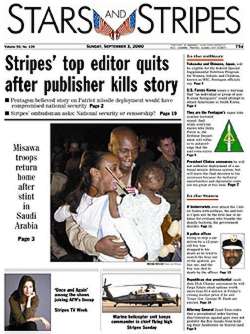David Offer of Stars and Stripes
By Robert F. Brandt Newsday
On the Thursday before Labor Day, the publisher of Stars and Stripes newspaper, Thomas Kelsch, called the paper from the American Forces Information Service and he ordered a story spiked. It was a story about an alert to deploy a Patriot missile battery from Germany to Israel. A story that in the past was routinely reported out by the Pentagon with wire service photos. And in this case was being told to the reporter, though unofficially, by US military personnel in Europe.

After the conversation, Dave typed his resignation and he put it in his pocket. Kelsch returned to Stars and Stripes and he entered into Dave's office where two key editors were discussing the situation with Dave, one in residence and one in Europe. And he said that he had received – this is Kelsch – said he had received a classified briefing that convinced him that lives could be lost if the story ran. After another heated conversation, Kelsch again refused to run the story.
Dave left the office and he went to close on his new home in the Washington area. And informed his wife, Susie, about his impending resignation.

The next morning when Dave came into the office, there was a firestorm among his angry staffers. Dave told Kelsch they intended to run the staff story and that he intended to run a story beside it about Stars and Stripes being censored. Kelsch responded that he did not know if they would be allowed to do that. He cited a Pentagon directive that prevented the paper from publishing original classified information. Kelsch went to check with his boss. An hour later he returned and ordered that the staff story be spiked and that the service's story be run.
Dave resigned.
It was the Friday before Labor Day, the morning after he had closed on his house with his wife. Dave had left behind a newspaper job in Newport, RI and Susie had left behind her business in Newport. Now neither of them was working. And that situation continues.
I spoke about ten to twelve days ago with Doug Clawson, who is the managing editor of Stars and Stripes. He said he misses Dave. And he said that the fight for the First Amendment at the Stars and Stripes was a daily fight. He said that the decibel level of that fight had grown exponentially. And that he was on the map, his newspaper. He said the lines were much clearer now. He said Dave's sacrifice was our gain.
He said that just that day, a few hours before I talked to him, that a new Pentagon directive had come down into his office, and that that directive allowed for the publication of original classified material. He said it was no longer banned at their newspaper. And Dave I thank you for this, for your courage, and your conviction. Could you please stand up and be recognized.
This was a "leadership moment" presented at the ASNE Convention April 3, 2001, at the J.W. Marriott Hotel in Washington, D.C.
